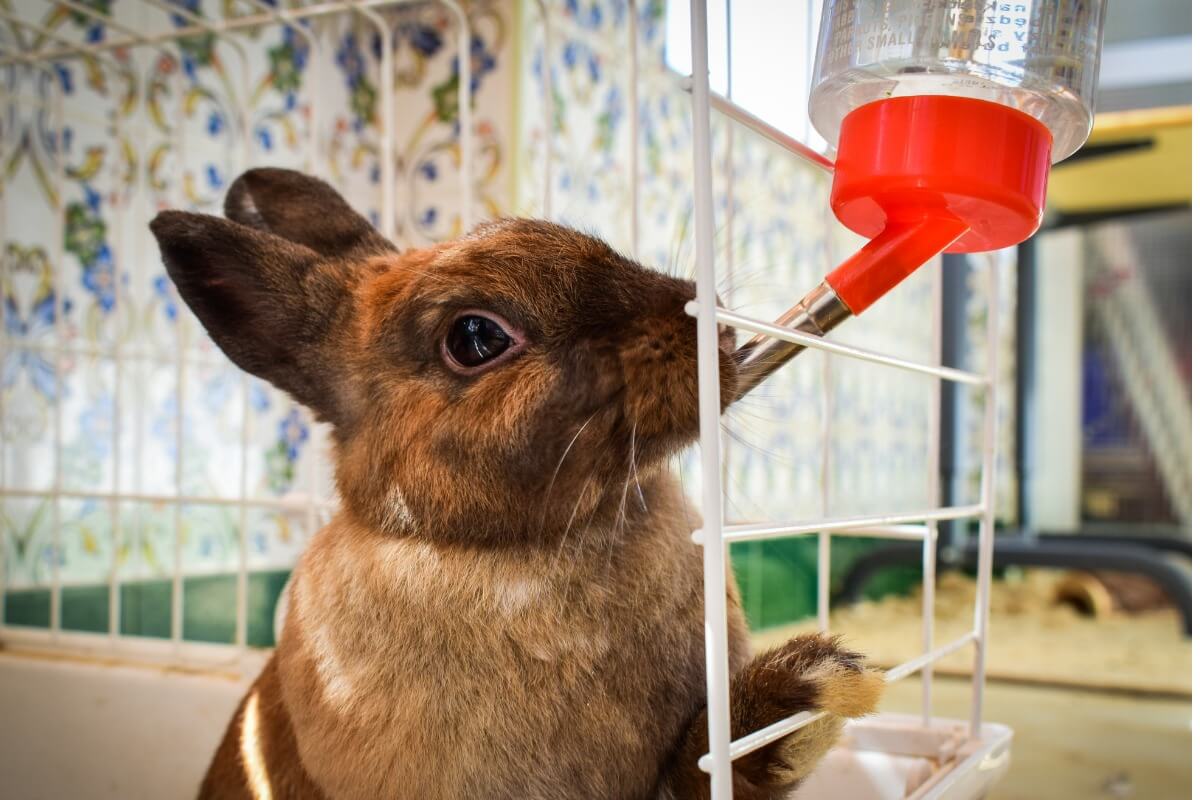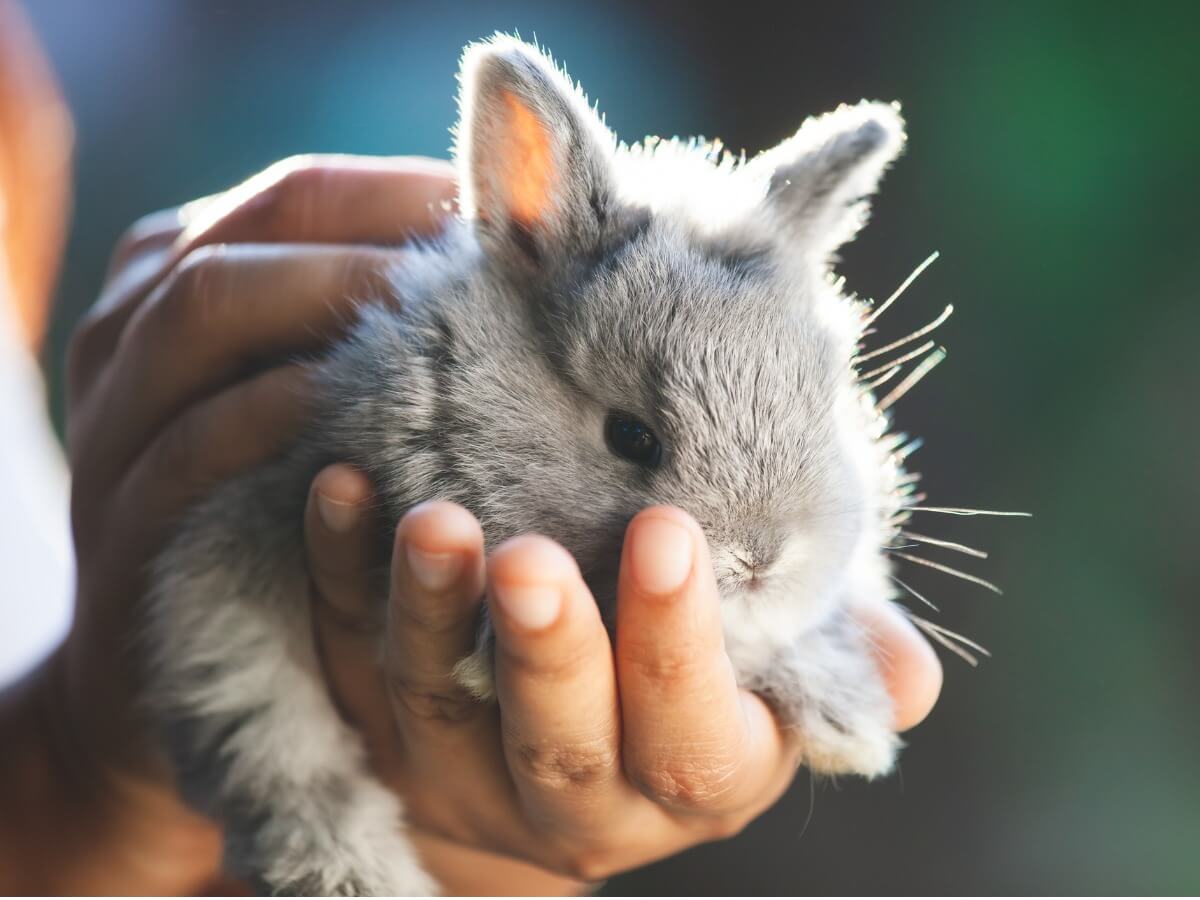Do Rabbits Drink Water?


Reviewed and approved by the biologist Samuel Sanchez
Even though rabbits have been pets for many decades now, it’s common for people to have questions about their habits, such as whether rabbits drink water. This question includes the optimal amount of liquid they should drink, how to stimulate them to drink and what to do if they refuse hydration.
In the following lines, we’re going to answer all these concerns. We’ll also include some of the reasons that can discourage rabbits from drinking water, so read on.
How much water should a rabbit drink?
Let’s start by answering the question in the heading of our article. Of course rabbits drink water! This is a vital liquid for all living things. However, this concern isn’t a random one, and has to do with the way rabbits were raised in the past.
According to scientific articles, a rabbit’s diet was much more natural in the past and included foods such as beets, carrots, and a great variety of fodder, all with high water content. For this reason, breeders didn’t usually give water to the rabbits, or at least it wasn’t a vital factor.
However, research indicates that breeding conditions have changed and these lagomorph mammals are often fed on fodder. This has a maximum percentage of humidity of 14%, which makes it indispensable to offer sources of liquid to satisfy the nutritional needs of these animals.

With respect to how much water a rabbit should drink, the exact figure will depend on the age of the animal. For example, a 5-week old rabbit weighing 600 grams will require about 80 milliliters of water daily, while a 1-year-old rabbit weighing 2500 grams (5.5 pounds) will require 400 milliliters of water in the same interval.
A 9-week old baby weighing 1100 grams will require between 250 and 300 cubic centimeters of this liquid each day. However, if the female has a litter, then the consumption will be higher: between 1,5 and 3 liters of water.
What to do if a rabbit drinks a lot of water?
Depending on the climatic conditions it’s normal for rabbits to drink more water than the amount that corresponds to their age and weight. An example of this is in the summer or other times of the year with high temperatures, where the heat leads the rabbit to sense the need to stay hydrated.
This behavior is also considered normal if the animal is very active and performs constant physical activities. If your rabbit is drinking too much water and these factors aren’t present, then it’s best to consult your veterinarian to rule out kidney problems and other conditions that could affect their health.
When does a rabbit not drink water?
We must begin by pointing out that when rabbits are fed with dry food, granulated food, or feed, it’s essential for them to consume water. This is due to the fact that mammals regulate the consumption of food based on the ingestion of liquid. As a result, if the animal doesn’t consume the water it needs, it won’t eat the right amount of food, giving rise to weight problems.
In addition to this, in the case of a mother that has just given birth, she’ll have problems with lactation, as there won’t be enough milk produced to feed the recently born rabbits if the mother doesn’t drink enough water. In addition, an inadequate intake of water causes difficulties in eliminating waste and toxins which can favor the appearance of enterotoxemia.
According to research, this disease causes organic lesions which can be fatal, so it should be prevented at all costs. Below, we’ll tell you some of the reasons why rabbits don’t drink water:
- The rabbit is old: It’s normal for an old rabbit to no longer exercise as it used to and not move as much. For this reason, it won’t have the same water requirements as a young rabbit. What isn’t normal is when the animal stops ingesting water altogether, or drinks too little. In this case, you should consult your vet and stimulate the intake with the help of professional recommendations.
- It doesn’t know how to drink water from the drinking bottle: Some drinking bottles have mechanisms that make life easier for the owner, but not for the animal. This is the case with some systems which have a straw that can discourage the rabbit from consuming water. The best thing to do is to offer the liquid in a bowl.
- It’s sick: Different illnesses can lead this mammal to stop drinking water. Among the symptoms that can alert you to problems are hair loss, soft stools, diarrhea, watery eyes, and rapid breathing. If you feel that your rabbit isn’t drinking water because it isn’t well, seek veterinary attention.
- Dirty water: If the water has nuggets of feed in it or other elements which make it dirty, the rabbit won’t drink it because the taste will be unpleasant to it.
- Broken drinking bottle: The rabbit may not drink enough water because the water bottle has leaks. The guardian should check it and ensure that the bottle is in good condition.
What to do to get a rabbit to drink water?
To encourage rabbits to drink water, their water bottle or bowl must be always clean and within reach. It’s also a good idea to vary the dry diet with food rich in water such as hay which provides important nutrients (derived from fiber), helps them to eliminate hairballs, wears down their teeth, and provides liquids.
Amongst other measures, you can consider the following:
- Include some vegetables such as carrots, lettuce (but in small amounts because it can cause diarrhea), spinach, tomatoes, and celery in their diet.
- Keep the water bowl full of fresh water.
- If you notice any distrust towards the drinking bottle or bowl, show it to the rabbit, wet your finger and bring it to its mouth very carefully.
- Teach the animal how to use the drinking bottle, especially if the rabbit is small.
Do wild rabbits drink water?
Wild rabbits also drink water, as this liquid is vital for the proper functioning of the body. The animals fortunate enough to live in freedom consume water from the water sources available to them, such as rivers, reservoirs and ponds. They complete the necessary intake with stems, berries, and other natural food.
However, it has to be said that the contamination of these sources can affect the lives of wild rabbits because, when they drink this water, they also take in toxic components: chemicals, pesticides, pharmaceuticals, plastics, and even radioactive substances. Because of this, it’s essential to take care of our rivers and tributaries.

Rabbits can and should drink water, whether in the wild or in captivity. If yours doesn’t show any interest in drinking, then you should go to the vet. Dehydration is a problem to avoid as far as small mammals are concerned.
Even though rabbits have been pets for many decades now, it’s common for people to have questions about their habits, such as whether rabbits drink water. This question includes the optimal amount of liquid they should drink, how to stimulate them to drink and what to do if they refuse hydration.
In the following lines, we’re going to answer all these concerns. We’ll also include some of the reasons that can discourage rabbits from drinking water, so read on.
How much water should a rabbit drink?
Let’s start by answering the question in the heading of our article. Of course rabbits drink water! This is a vital liquid for all living things. However, this concern isn’t a random one, and has to do with the way rabbits were raised in the past.
According to scientific articles, a rabbit’s diet was much more natural in the past and included foods such as beets, carrots, and a great variety of fodder, all with high water content. For this reason, breeders didn’t usually give water to the rabbits, or at least it wasn’t a vital factor.
However, research indicates that breeding conditions have changed and these lagomorph mammals are often fed on fodder. This has a maximum percentage of humidity of 14%, which makes it indispensable to offer sources of liquid to satisfy the nutritional needs of these animals.

With respect to how much water a rabbit should drink, the exact figure will depend on the age of the animal. For example, a 5-week old rabbit weighing 600 grams will require about 80 milliliters of water daily, while a 1-year-old rabbit weighing 2500 grams (5.5 pounds) will require 400 milliliters of water in the same interval.
A 9-week old baby weighing 1100 grams will require between 250 and 300 cubic centimeters of this liquid each day. However, if the female has a litter, then the consumption will be higher: between 1,5 and 3 liters of water.
What to do if a rabbit drinks a lot of water?
Depending on the climatic conditions it’s normal for rabbits to drink more water than the amount that corresponds to their age and weight. An example of this is in the summer or other times of the year with high temperatures, where the heat leads the rabbit to sense the need to stay hydrated.
This behavior is also considered normal if the animal is very active and performs constant physical activities. If your rabbit is drinking too much water and these factors aren’t present, then it’s best to consult your veterinarian to rule out kidney problems and other conditions that could affect their health.
When does a rabbit not drink water?
We must begin by pointing out that when rabbits are fed with dry food, granulated food, or feed, it’s essential for them to consume water. This is due to the fact that mammals regulate the consumption of food based on the ingestion of liquid. As a result, if the animal doesn’t consume the water it needs, it won’t eat the right amount of food, giving rise to weight problems.
In addition to this, in the case of a mother that has just given birth, she’ll have problems with lactation, as there won’t be enough milk produced to feed the recently born rabbits if the mother doesn’t drink enough water. In addition, an inadequate intake of water causes difficulties in eliminating waste and toxins which can favor the appearance of enterotoxemia.
According to research, this disease causes organic lesions which can be fatal, so it should be prevented at all costs. Below, we’ll tell you some of the reasons why rabbits don’t drink water:
- The rabbit is old: It’s normal for an old rabbit to no longer exercise as it used to and not move as much. For this reason, it won’t have the same water requirements as a young rabbit. What isn’t normal is when the animal stops ingesting water altogether, or drinks too little. In this case, you should consult your vet and stimulate the intake with the help of professional recommendations.
- It doesn’t know how to drink water from the drinking bottle: Some drinking bottles have mechanisms that make life easier for the owner, but not for the animal. This is the case with some systems which have a straw that can discourage the rabbit from consuming water. The best thing to do is to offer the liquid in a bowl.
- It’s sick: Different illnesses can lead this mammal to stop drinking water. Among the symptoms that can alert you to problems are hair loss, soft stools, diarrhea, watery eyes, and rapid breathing. If you feel that your rabbit isn’t drinking water because it isn’t well, seek veterinary attention.
- Dirty water: If the water has nuggets of feed in it or other elements which make it dirty, the rabbit won’t drink it because the taste will be unpleasant to it.
- Broken drinking bottle: The rabbit may not drink enough water because the water bottle has leaks. The guardian should check it and ensure that the bottle is in good condition.
What to do to get a rabbit to drink water?
To encourage rabbits to drink water, their water bottle or bowl must be always clean and within reach. It’s also a good idea to vary the dry diet with food rich in water such as hay which provides important nutrients (derived from fiber), helps them to eliminate hairballs, wears down their teeth, and provides liquids.
Amongst other measures, you can consider the following:
- Include some vegetables such as carrots, lettuce (but in small amounts because it can cause diarrhea), spinach, tomatoes, and celery in their diet.
- Keep the water bowl full of fresh water.
- If you notice any distrust towards the drinking bottle or bowl, show it to the rabbit, wet your finger and bring it to its mouth very carefully.
- Teach the animal how to use the drinking bottle, especially if the rabbit is small.
Do wild rabbits drink water?
Wild rabbits also drink water, as this liquid is vital for the proper functioning of the body. The animals fortunate enough to live in freedom consume water from the water sources available to them, such as rivers, reservoirs and ponds. They complete the necessary intake with stems, berries, and other natural food.
However, it has to be said that the contamination of these sources can affect the lives of wild rabbits because, when they drink this water, they also take in toxic components: chemicals, pesticides, pharmaceuticals, plastics, and even radioactive substances. Because of this, it’s essential to take care of our rivers and tributaries.

Rabbits can and should drink water, whether in the wild or in captivity. If yours doesn’t show any interest in drinking, then you should go to the vet. Dehydration is a problem to avoid as far as small mammals are concerned.
All cited sources were thoroughly reviewed by our team to ensure their quality, reliability, currency, and validity. The bibliography of this article was considered reliable and of academic or scientific accuracy.
- El agua y su consumo por el conejo. Selections Avicoles. Núm. 310: 40-41, 1992.
- Enterotoxemia del conejo. Cunicultura. Universidad Autónoma de Barcelona. 1997.
This text is provided for informational purposes only and does not replace consultation with a professional. If in doubt, consult your specialist.








